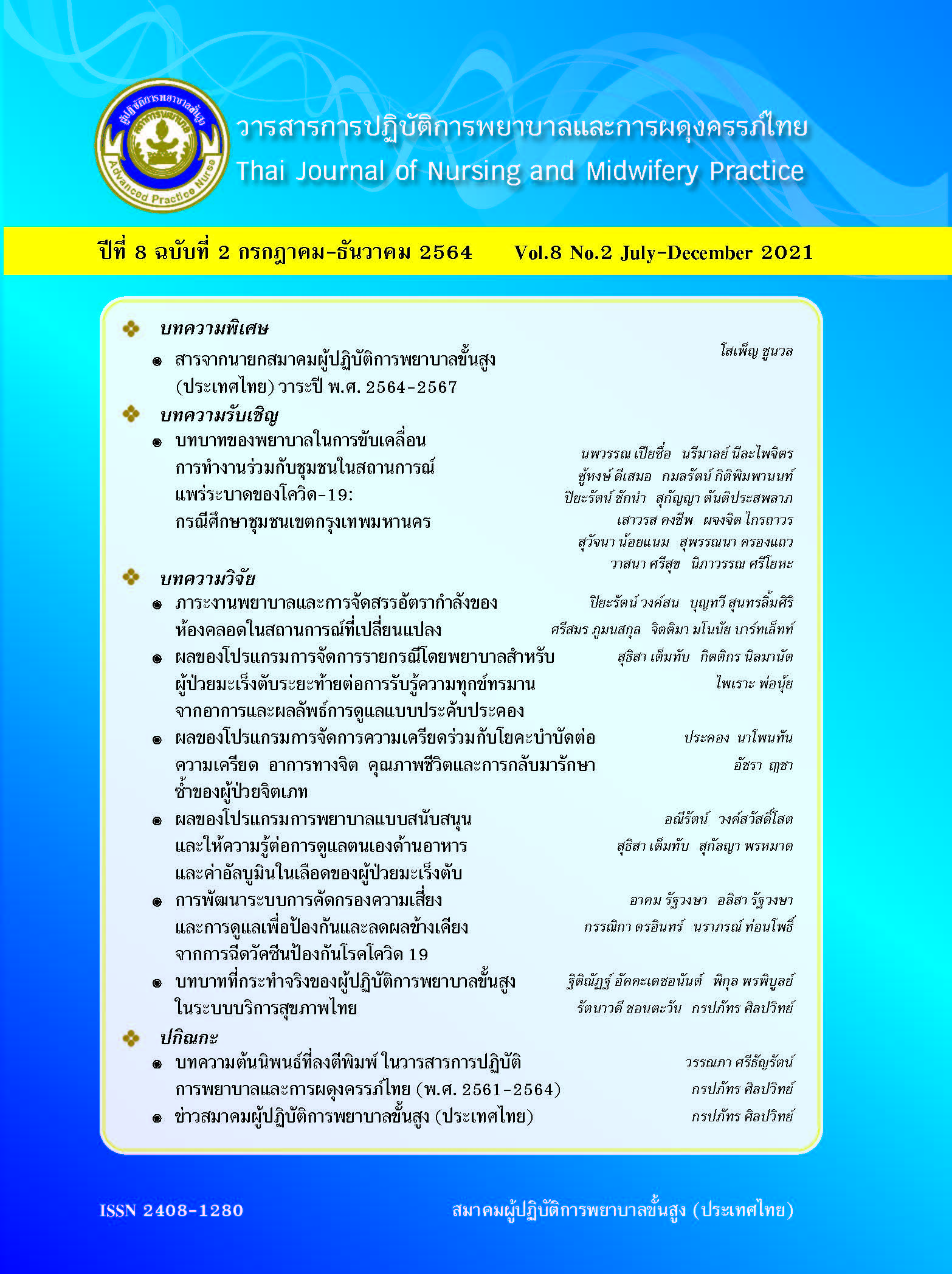The Effect of Stress Management with Yoga Therapy Program on Stress, Psychotic Symptoms, Quality of Life, and Relapse among Schizophrenia Patients
Main Article Content
Abstract
This randomized control trails (RCTs) aimed to evaluate the effects of stress management with yoga therapy program on stress, psychotic symptoms, quality of life and relapse in schizophrenia patients. The sample consisted of schizophrenic patients, aged 20-59 years. They were randomly selected to the experimental and the control group with 20 people in each group. The experimental group received 10 sessions of stress management in conjunction with yoga practices. The control group received usual care. The study was conducted during December 2019 to November 2020. The research tools were: the Brief Psychotic Rating Scale: BPRS; the Thai version of the PSS-10; the Perceived Stress Scale: T-PSS-10; and the WHOQOI-BREF-THAI. Data were analyzed using repeated measure ANOVA. Results showed that the experimental group had lower mean scores of stress and psychotic symptoms, but higher in quality of life than the control group with statistically significant differences (p<0.05). The sample in the experimental group, had not been readmitted; while in the control group, 5 subjects had been readmitted within 3 months. The stress management with yoga therapy program should be used to reduce stress, psychotic symptoms, and readmission rate; while help improve quality of life of people with schizophrenia.
Downloads
Article Details

This work is licensed under a Creative Commons Attribution-NonCommercial-NoDerivatives 4.0 International License.
References
Wuttiliuk P. Nursing care of patients with schizophrenia: role and process. 2nd ed. Chiang Mai: Design print media; 2018. (In Thai)
Lazarus S, Flokman S. Stress apprarisal and coping. NewYork: Springer Pubishing;1984.
Govindary R,Naik S,Manjunath NK,Varambally S.Add on yoga therapy for social cognition in schizophrenia 2018;11:242-44.
Jayaram N, Varamball S, Behere RV, Venkatasubramanion G. Effect of yoga therapy on plasma oxytocin and facial emotion recognition deficits in patients of schizophrenias. Acta Psychiatr Scand 2017;123(2):147-53.
Paikkatt B, Ranjan Singh A, Kumar Singh P, Jahan M, Rajan JK.Efficacy of yoga therapy for the mamagement of psychopathology of patients having chronic schizophrenia.India J Psychitry 2016;57(4):355-60.
Neuechterlein HK, Dewson ME, Ventura J, Gitlin M, Subotnik KL, Snyder KS. The vulnerabilitystress model of schizophrenia relapse: A longitudinal study. Acta Psychiatrica Scandinavica 1994; (89):58-64.
Lasaker PH, Carclone A, Dimaggio G, Johannesen LK, Nicolo G, Procacci M, Semerari A. Metacognition amidst narrative of self and illness in schizophrenia: associations with neurocognition, symptoms insight and quality of life. Acta Psychiatrica Scandinavica
;112(1):64-71.
Darmedru C, Franck N. Cognitive remediation and social cognitive training for violence in schizophrenia: A systematic review. Schizophrenia Bull;2017.
Fangkaew P, Deangdoomyut P. Effect of anger management focus on cognitive of aggressive behavior among schizophrenic patients. Journal of Psychiatric Nursing and Mental Health 2562;33(1):53-65. (In Thai)
Udomrat P, Wasiknanon S. Texbook for mental illness. Songkla: Chanmeang printing;2552.(In Thai)
Kavak F, Ekinei M. The effect of yoga on functional recovery level in schizophrenia patients. Archives of Psychiatric Nursing 2016;30:761-67.
Zubin J, Spring B. Vulnerability: A new view of schizophrenia. Journal of Abnormal Psychology1977;86:103–26.
Bhere RV, Arasappa R, Jagannathan A, Varambally S, Venkatasubramanian G, Thirthalli J, et al. Effect of yoga therapy on facial emotion recognition deficits, symptoms and functioning in patients with schizophrenia. Acta Psychiatrica Scandinavica 2011;123:147-53.
Cramer H, Lauche R, Klose P, Langhorst J, Dobus G. Yoga for schizophrenia: A systematic review and meta-analysis. BMC Psychiatry 2013:13-32.
Dominguez G, Viechtbaure W, Simons CJ, Van J, Krabbendam L. Are psychotic psychopathology and neurocognition orthogonal? A systematic review of their associations. Psychol Bull 2015;135:157-71.
Patricia Cabral BA, Hilary B, Meyer BA, Donna Ames.Effectiveness of yoga therapy as acomplementary treatment for major psychiatric: A Meta-analysis.The primary care companion for CNS disorder 2012;13(4):652-57.
Banalore N, Varambally S. Yoga therapy for schizophrenia. International Journal of Yoga 2012;5 (2):58-91.
Norman RG, Mall AK, Mclean EM, Neufeld RW, Vouganci LP.et al. An evaluation of a stress management program for individual with
schizophrenia. Schizophrenia Research 2002;58: 293-303.
Overall J E, Gorham D R. The Brief Psychiatric Rating Scale. Psychological Reports 1962;10(3): 799-812.
Wongpakaran N, Wongpakaran T. The Thai version of the PSS-10: An investigation of its psychometric properties. Boipsychosocial Medicine 2010;(12):4-6.
Mahatnirankul S, Tantiphiwattanasakul W, Phumpaisanchai W.et al.Thai version of the World Health Organization Quality of Life Indicators. Nonthaburi:Department of Mental Health; 2002. (In Thai)
Khisaxad P, Dangdomyuth P. Effect of stress management on psychotic symptoms in patient with schizophernia. [Dissertation].Bangkok: Chulalongkorn university;2014. (In Thai)
Kumar S, Subramaniam E, Bhavanani AB, Sarkar S, Balasundaram S. Effect of adjunct yoga therapy in depressive disorders: Findings from a randomized controlled study. Indian J Psychiatry 2019;61 (6):592-7.
Gautam S, Jain A, Marwale AV, Gautam A. Clinical practice guidelines for patients with mental disorders. Indian J Psychiatry 2020;62(12):272-9.
Kishan P. Yoga and spirituality in mental health: illness to wellness. Indian J Psychol Med 2020;42(5):411-20.


